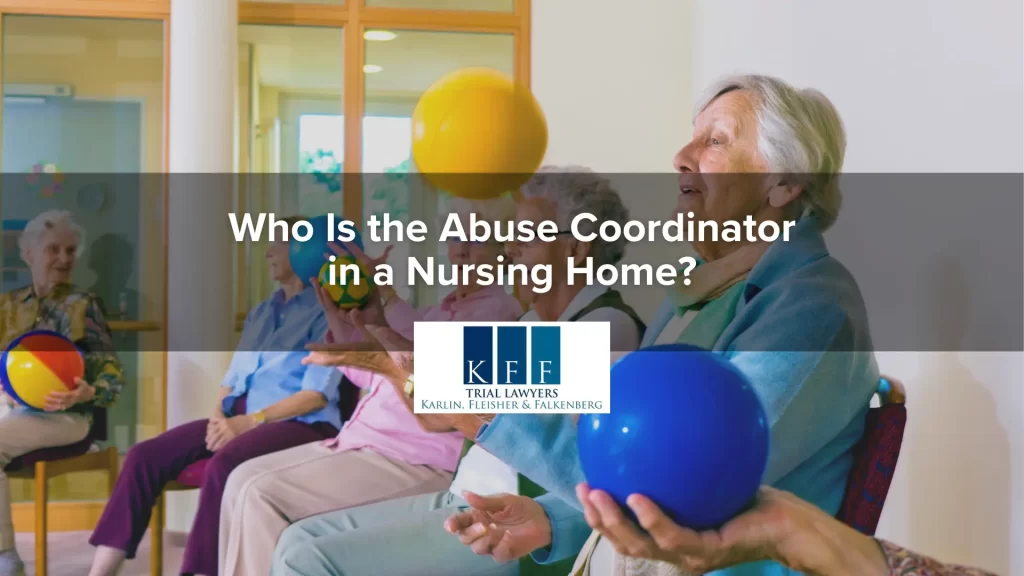
Nursing homes have a legal and moral duty to care for our loved ones who reside there. We trust that they will provide their residents with quality care that meets high standards. Unfortunately, this is not always the case, and abuse in nursing homes does exist. If you suspect your loved one is experiencing nursing home abuse, you can do something about it.
What Is an Abuse Coordinator?
A facility abuse coordinator in a nursing home is a staff member responsible for managing and addressing issues related to abuse or neglect within the facility. This person is often the facility’s administrator. They promote a safe environment for nursing home residents and thoroughly address any instances of abuse.
They can spot different forms of abuse in nursing homes, including:
- Mental
- Physical
- Sexual
- Financial
- Neglect
Abuse Prevention in a Nursing Home
Abuse coordinators have a significant role in preventing abuse in a nursing home or assisted living facility. However, under Illinois law, all nursing home employees must report abuse or neglect once they detect it or are informed of it.
All responsible nursing home staff should be vigilant for signs of abuse or neglect, with a multifaceted program of prevention, education, and awareness. The facility should:
- Implement policies and procedures to prevent physical, emotional, sexual, or financial abuse of residents or neglect of their needs, such as monitoring systems and ongoing education.
- Train staff to recognize warning signs of abuse and how to report suspected incidents.
- Report suspected or confirmed incidents of abuse or neglect to appropriate authorities.
- Inform family members or authorized agents of suspected or confirmed abuse or neglect.
- Coordinate with adult protective services or law enforcement to address and resolve abuse or neglect cases.
- Provide comfort and support to residents, including access to medical care or counseling.
- Keep detailed records of reported incidents, investigations, and actions to address concerns of abuse or neglect.
How Do I Report Suspected Nursing Home Abuse?
It can be upsetting, stressful, and challenging when you realize that a loved one is experiencing abuse or neglect. Reporting abuse requires courage to speak out, but no one should live in an unsafe or dangerous environment. Here are steps you can take if you suspect that your loved one is a victim of nursing home abuse or neglect:
- Move Your Loved One – If your loved one is in danger, move them to another facility or to someone’s home immediately.
- Consult a Lawyer – Even before advising the nursing facility, contact an attorney. If you make the facility aware first, they could move to eliminate evidence of the abuse. A nursing home attorney can gather evidence and report suspected abuse to the appropriate agency.
- Inform the Facility Abuse Coordinator – They must report and address the situation, whether resident-to-caregiver or resident-to-resident abuse. If they fail to report abuse, they can face legal penalties.
- Contact the Illinois Ombudsman – The Illinois Long-Term Care Ombudsman Program helps nursing home and long-term care facility residents and their families by informing them of their rights and options, championing their best interests, and investigating care facility complaints. Various regional contacts serve care facilities across the state.
- Call the Senior Helpline – The Senior Helpline provides information on programs for older individuals and their caregivers, with resources and links to local services.
- File a Complaint – The Illinois Department of Public Health (IDPH) can investigate a care facility. You can file a complaint about a nursing home, hospital, or elder home health agency by phone or online.
When Should I Contact a Nursing Home Abuse Lawyer?
If you see any of these warning signs of nursing home abuse, get your loved one to safety and immediately call a nursing home abuse lawyer:
- Changes in your loved one’s mental, emotional, or physical well-being (unrelated to any medical condition), such as bruises, bedsores, worsening physical condition, signs of malnutrition or dehydration
- Repeated, unexplained visits to the facility doctor or local ER
- Reluctance by your loved one to participate in activities they previously enjoyed
- Signs of distress or appearing to feel uncomfortable around staff members
What Is the Statute of Limitations for Nursing Home Abuse?
The Illinois statute of limitations for nursing home abuse lawsuits allows two years from the date you discover or should have found the injury to file suit against the offending person or facility. Filing as soon as you discover abuse or neglect is critical to seeking compensation.
How Can a Nursing Home Abuse Lawyer Help Me?
 A nursing home abuse lawyer can help you organize and file a claim against an abusive or negligent living facility. A nursing home abuse lawyer can:
A nursing home abuse lawyer can help you organize and file a claim against an abusive or negligent living facility. A nursing home abuse lawyer can:
- Conduct an Investigation – Your attorney can interview staff members, other residents, and witnesses to substantiate abuse allegations and build a case.
- Collect Evidence – Your lawyer can review a facility’s history of complaints, which could indicate poor care and living conditions.
- Review Medical Records – Your lawyer can read your loved one’s medical records to uncover potential inconsistencies, find a documented cause for their condition, and answer any questions you might have about your loved one’s care.
- Pursue Compensation – Your lawyer can evaluate your claim, determine fair value, and seek that amount to cover your loved one’s losses. They can negotiate a fair settlement from the nursing home or file a claim in court.
- Offer Support – You can report suspected abuse and file a complaint against a care facility independently, but you may feel more empowered to do so with legal assistance.
You can seek compensation for:
- Medical treatment costs
- Facility relocation expenses
- Pain and suffering
- Mental anguish
Contact an Experienced Illinois Nursing Home Abuse Lawyer
You should call an Illinois nursing home abuse lawyer if you suspect your loved one is suffering abuse from someone working or living in their care facility. You need a law firm ready and prepared to fight for you.
At Karlin, Fleisher & Falkenberg, LLC, our dedication and commitment to protecting you and your loved one drives us to pursue the compensation you deserve. We can provide the skilled legal help you need.
Call 312-346-8620 for your free consultation with our team of attorneys at Karlin, Fleisher & Falkenberg, LLC today.
Related posts:
